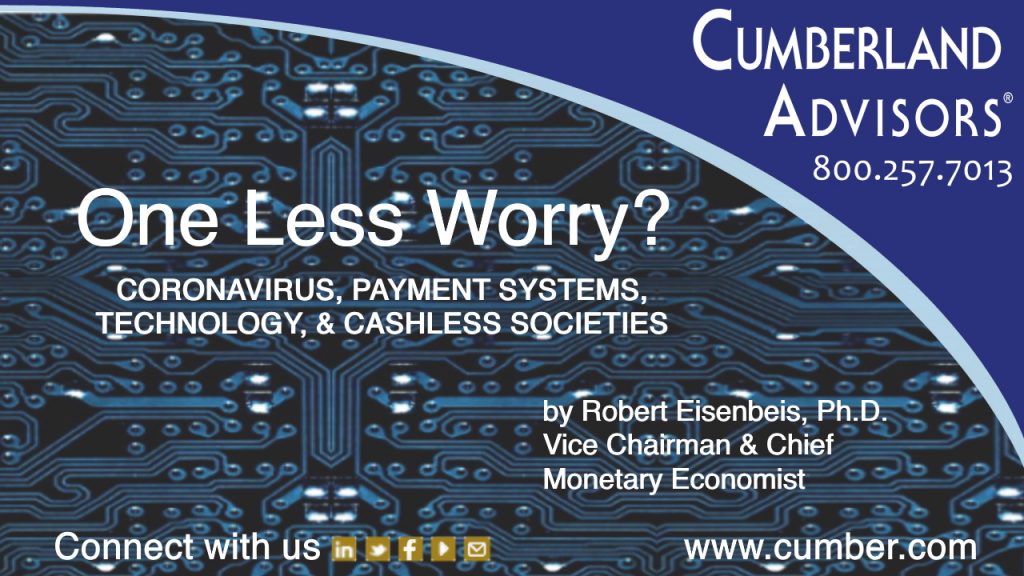It is tempting to focus on the here and now, especially when we are worrying about the economic fallout from the coronavirus pandemic and its impact on the nation. We are withdrawing from social contact and are concerned about all sources of risks. We have seen reports of people sanitizing cash as one way of protecting against the transmission of the virus, and we have all experienced expanded use of electronic payments via cell phones, credit cards, and even no-signature requirements as a way of avoiding touching touchscreens at all point-of-sale terminals.
The fact is that we are moving closer to being a cashless society; and that may be, at least here in the US, one of the side effects of 9/11 and the growth of technology. When 9/11 occurred, the Fed was forced to arrange trucks to transfer checks across the country since its private fleet of airplanes that physically transported paper checks from place to place could not fly. In response to that experience, both the Fed and the private sector made changes to how transactions were cleared and settled and installed robust backup processes.
As a consequence of those changes, technology may be an important and underappreciated source of resilience for our financial system, mitigating some of the possible costs of the financial crisis. On CNN just recently there was an interview of an expert and her response to the NY governor’s claim that a lockdown of New York would cause economic disaster to the US economy. She made the point that financial markets are now essentially electronic and that we have already operated a week with the floor of the NY Stock Exchange closed. The exchange floor is basically a TV set at this point, and is not critical to the functioning of equity markets.
The same is true of all the actions that the Federal Reserve has taken to support financial markets. The Treasury market is electronic; the repo market is electronic; the federal funds market is electronic, as are the SWIFT international foreign exchange market, the large dollar transfer system, the credit card system, and the ACH funds transfer system among financial institutions, just to name a few.
As far as retail payments are concerned, prior to 9/11, checks and check clearing was so important that the Federal Reserve had 56 facilities across the country involved in the physical transfer of paper checks. Now it has only one office involved in that activity. The reason is that check images are now captured electronically and are truncated at the point of sale. Much of this shift was the logical fallout of the changes in the payment system that resulted from 9/11.
Why is this important today? Well, we can continue to go to the store and use credit cards, phones, and the like (electronics) to make purchases with greatly reduced risk of picking up the coronavirus or transferring it to others. While this convenience may not seem like a big deal, transferring money electronically certainly reduces risk in this time of crisis and is one less thing to worry about.
At Cumberland Advisors we have been working remotely for more than a week with full functionality, using technology and implementing emergency preparedness procedures that we had developed for exactly such a crisis.
Robert Eisenbeis, Ph.D.
Vice Chairman & Chief Monetary Economist
Email | Bio
Links to other websites or electronic media controlled or offered by Third-Parties (non-affiliates of Cumberland Advisors) are provided only as a reference and courtesy to our users. Cumberland Advisors has no control over such websites, does not recommend or endorse any opinions, ideas, products, information, or content of such sites, and makes no warranties as to the accuracy, completeness, reliability or suitability of their content. Cumberland Advisors hereby disclaims liability for any information, materials, products or services posted or offered at any of the Third-Party websites. The Third-Party may have a privacy and/or security policy different from that of Cumberland Advisors. Therefore, please refer to the specific privacy and security policies of the Third-Party when accessing their websites.
Sign up for our FREE Cumberland Market Commentaries
Cumberland Advisors Market Commentaries offer insights and analysis on upcoming, important economic issues that potentially impact global financial markets. Our team shares their thinking on global economic developments, market news and other factors that often influence investment opportunities and strategies.


